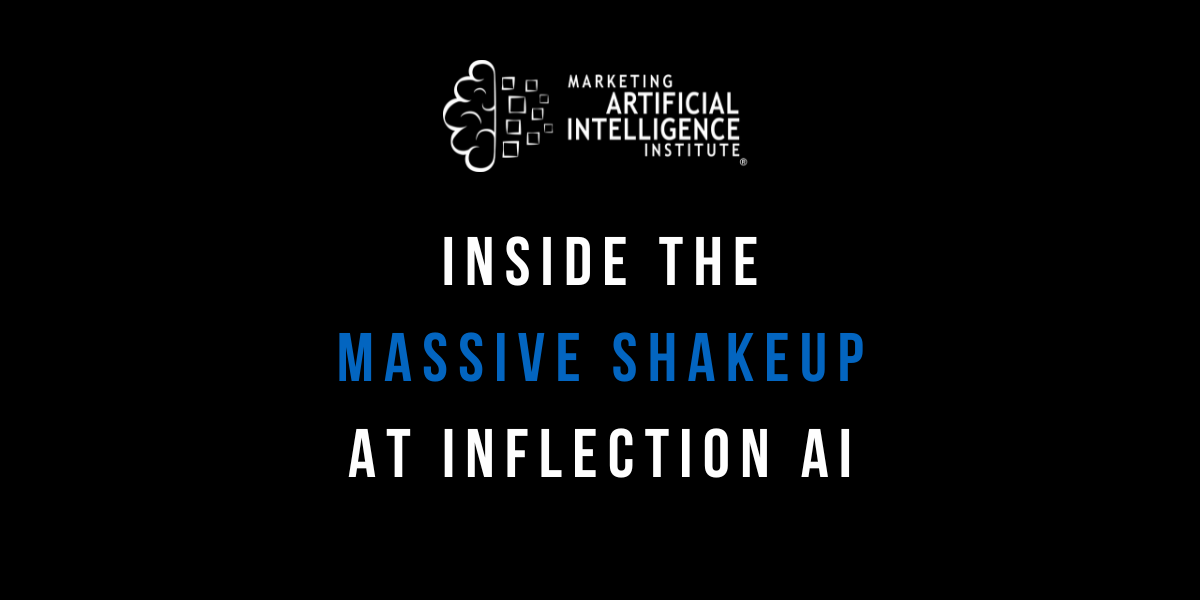We just got some huge news about a leading AI company. And it's a wake-up call for any AI startup trying to take on the tech giants.
Mustafa Suleyman, the co-founder and CEO of Inflection AI, is leaving the company he helped build to start a new AI division at Microsoft. As part of the move, which some see as functionally an acquisition, Microsoft will be able to use Inflection's models and has hired most of its staff in a deal worth $650 million.
Inflection AI had raised a whopping $1.5 billion (including from Microsoft). It is using the funds to pay back some of its investors.
The company says it will continue with a new CEO and lean into its "AI studio" business crafting custom models for commercial clients.
Inflection is (was?) a giant in the space. So the news is a shock. And it points to a fiercely competitive marketplace where even $1.5 billion in funding and some of AI's top minds aren't enough to win.
What can we learn from Inflection's new direction?
I got the scoop from Marketing AI Institute founder/CEO Paul Roetzer on Episode 89 of The Artificial Intelligence Show.
What this is really about
"In essence, it's an acquisition without actually buying the company," says Roetzer of the move.
What was Microsoft hoping to achieve with the acquisition? Some of it is surely about scooping up top-tier AI talent. But it could also be about scooping up more AI firepower.
"They are rumored to have 22,000 GPUs," says Roetzer. These highly valuable chips are worth hundreds of millions of dollars.
"What happens now?"
A more immediate question is:
What happens to Inflection's flagship product, Pi? Pi is a popular AI assistant used by many for personal tasks and conversations.
Presumably, it's getting sunsetted at some point. Which. makes this a cautionary tale, says Roetzer. If you were using it regularly, "what happens now?" he asks.
Does your data go to Microsoft? Is there a comparable tool you can use to replace all the things you valued in Pi?
This is just one example of what happens in the chaotic AI market. Even very popular tools from leading companies can go away overnight.
It's difficult, if not dangerous, to bet on a single company or tool for your core use cases.
It's also a cautionary tale for companies competing in AI.
"If you don't have data and all you have is a model and computing power and some talent and some VC money, it's only going to get so far, unless you find some massive differentiator," says Roetzer.
"It's really, really hard to bet against the big players."
What happens at Microsoft?
The Inflection "acquisition" raises uncomfortable questions about business as usual at Microsoft.
Inflection and OpenAI are competitors, and Microsoft is the biggest investor in OpenAI.
"So what happens there?" asks Roetzer.
The move is also very similar to one Sam Altman and Greg Brockman at OpenAI almost made. When Altman was fired, Microsoft announced Altman and Brockman would be forming their own team at the company. This was before Altman was reinstated.
Not to mention, the move may ruffle feathers within Microsoft, not just with its partners.
"Now they have an AI division and Mustafa is the CEO of it, which is a shake up to all the other AI talent at Microsoft," says Roetzer.
Mike Kaput
As Chief Content Officer, Mike Kaput uses content marketing, marketing strategy, and marketing technology to grow and scale traffic, leads, and revenue for Marketing AI Institute. Mike is the co-author of Marketing Artificial Intelligence: AI, Marketing and the Future of Business (Matt Holt Books, 2022). See Mike's full bio.



